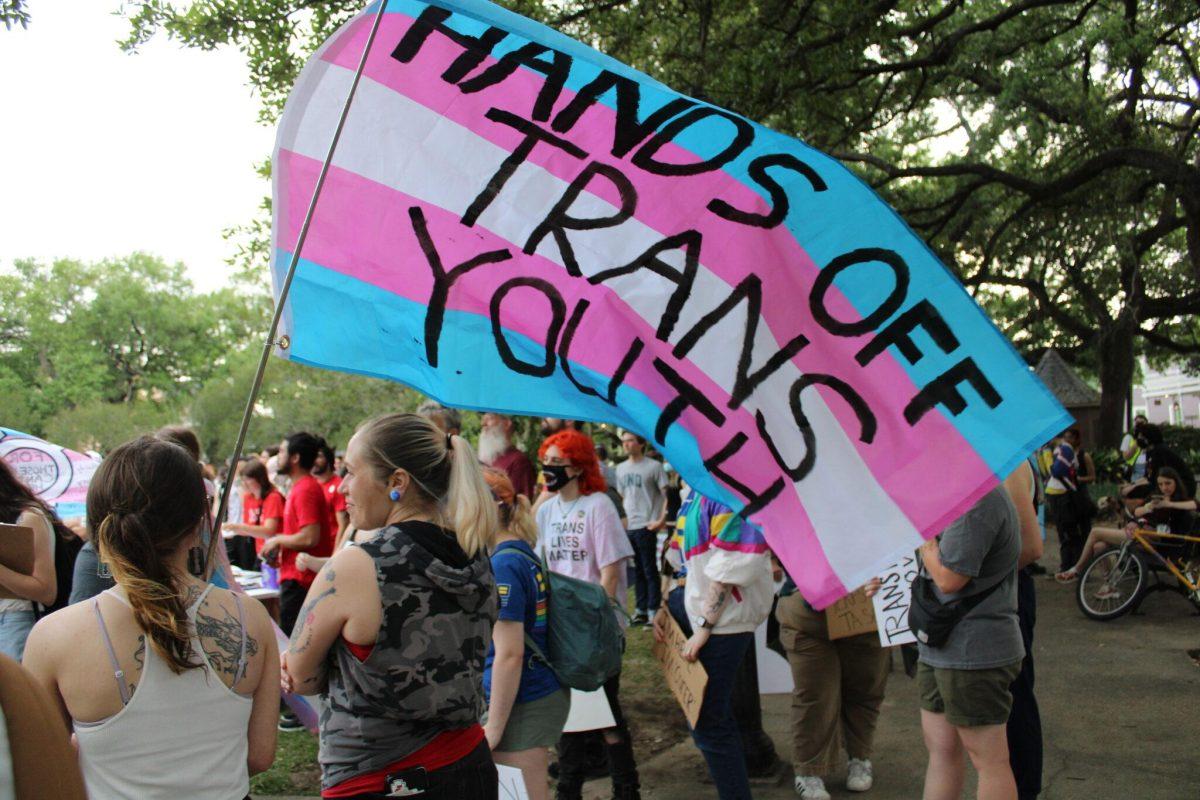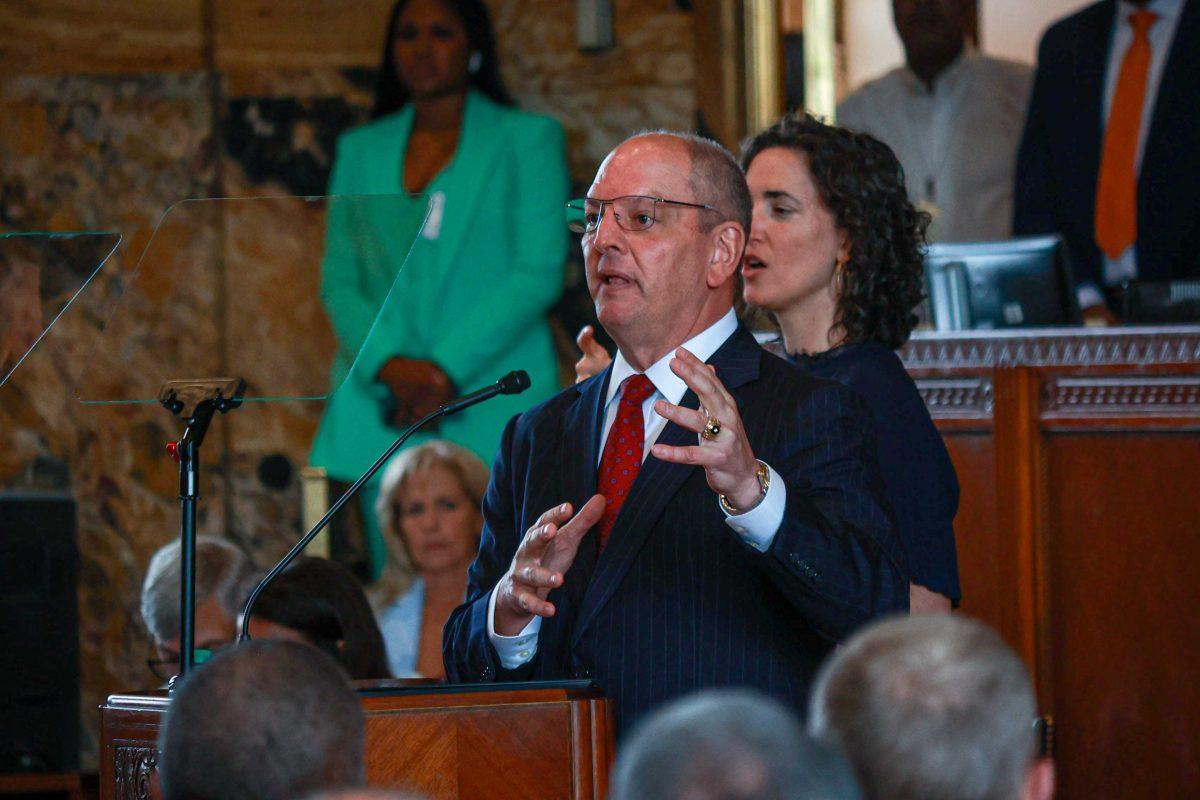Note: Click here to see the Louisiana Illuminator’s original reporting.
A Louisiana Senate committee killed a proposed ban on gender affirming healthcare for transgender youth Wednesday, giving a rare victory to LGBTQ+ activists combating care restrictions throughout the southeast.
The Senate Health and Welfare Committee voted 5-4 to involuntarily defer House Bill 648 by Rep. Gabe Firment, R-Pollock, killing the bill for the year. Committee Chair Sen. Fred Mills, R-Parks, bucked his party to break the tie between Republicans and Democrats on the committee.
“Always in my heart of hearts have I believed that a decision should be made by a patient and a physician. I believe in the physicians in Louisiana,” Mills, a pharmacist, said. “I believe in the scope of practice. I believe in the standard of care.”
Firment’s proposal, which would have banned all gender-affirming healthcare for transgender minors, is similar to proposals filed in at least 17 other states, including every state on the Gulf Coast. An AP analysis found most of these bills have strong similarities to model legislation right-wing organizations have put forward.
Louisiana has bucked the trend of anti-LGBTQ+ legislation being approved around the country — at least temporarily. If reelected, Firment is likely to bring the bill back next year, after Democratic Gov. John Bel Edwards, who has said anti-LGBTQ+ legislation will lead to more suicides among trans youth, has left office.
After the vote, dozens of transgender people and LGBTQ+ advocates filed into the hall, tearfully hugging and celebrating the narrow victory.
“I’m so grateful,” Peyton Rose Michelle, executive director of Louisiana Trans Advocates said.
Michelle credited Mills with educating himself and listening to his constituents to make what she said was the right call.
“He heard us,” Michelle added.
Cathleen Hyde, the mother of a transgender boy, said she was overjoyed and relieved she would not have to make arrangements to take her son out of state to receive medical care.
Gender-affirming care is a catch-all term for medical treatments given to people to align their physical bodies with their identified gender. Gender-affirming care is used by transgender people, who identify as a gender different from their sex assigned at birth, as well as cisgender people, who identify as their assigned sex.
Treatments are individualized to the patient. Some young patients will be prescribed fully reversible puberty blockers, giving the patient time to consider their options.
Later, a patient may be given hormone treatments that can help young people go through puberty in a way that allows their body to change in ways that align with their gender identity. These treatments are partially reversible.
Minors are typically not provided surgical procedures such as top surgery, which adds or removes breast tissue, or bottom surgery, which constructs a vagina or penis. While much of the conversation on Firment’s bill has centered on these procedures, such surgeries are not recommended for minors, according to Dr. Kathryn Lowe, a pediatrician who represents the American Academy of Pediatrics Section on LGBT health and wellness.
“It’s more common for cisgender youth to access some of the surgeries that are talked about in a lot of these bills than it is for transgender youth to access it,” Lowe said in an interview.
Despite these differences, Firment’s bill sought to lump all of these treatments together, referring to them as experimental. However, the treatments are not considered experimental and are supported by decades of use and most major medical associations.
To support his claims, Firment was joined in presenting his bill by Dr. Quentin Van Meter, an endocrinologist and president of the American College of Pediatricians, a far-right advocacy group that supports disproven conversion therapy and opposes marriage equality, abortion and gender-affirming care.
The American College of Pediatricians is classified as a hate group by the Southern Poverty Law Center and stands in opposition of the position on gender-affirming healthcare put forward by the American Academy of Pediatrics, the nation’s preeminent pediatric medical association.
Van Meter shared several pieces of misinformation during his testimony.
“There is no benefit to mental health in taking transgender children and affirming them medically or surgically,” Van Meter said. “To say that these children are going to commit suicide if we do not go ahead and affirm them is a bald-faced lie. It’s a bludgeon for parents to make them feel guilty.”
Multiple studies indicate approximately 80% of transgender youth have considered suicide, and 40% report at least one suicide attempt. Research also has confirmed gender-affirming healthcare leads to improved mental health outcomes.
“That evidence shows that young people suffering from gender dysphoria who receive the gender-affirming standard of care experience improvements in their overall well-being, to the point that their level of well-being is generally consistent with that of their non-transgender peers,” the American Academy of Pediatrics wrote in an amicus brief filed in opposition to Arkansas’ gender affirming care ban.
Donna Lambert, the mother of a transgender child, spoke in support of the bill, sharing the story of her own child’s suicide attempt.
“The moment professionals add the dreaded line, ‘If you do not affirm, you will be the cause of your child’s death,’ it’s impossible for parents to make a rational decision,” Lambert said.
Lambert, consistently misgendering her child, opted against affirming her child.
“When mental health professionals told me that if she killed herself, I would be the cause of her death for not believing she was born in the wrong body, I didn’t accept that ridiculous statement,” Lambert said.
Lamber said her child tried to take their own life and then cut contact with her.
Several doctors and psychologists spoke in opposition to the bill.
Clifton Mixon, a psychologist that specializes in treating gender-diverse youth, pushed back on some of the misinformation the bill’s proponents shared.
“No provider I know of in the state is trying to turn kids transgender. We are trying to allow transgender kids to grow up and become trans adults by improving their quality of life and preventing premature death by suicide,” Mixon said.
Mixon said the gender clinic he works at prescribes hormones after the patient’s gender dysphoria has been persistent for a long period and is causing serious impairments, including anxiety, depression, self-harm, suicidal ideations and attempts, academic decline and social withdrawal, and only after they’ve exhausted other options including therapy and psychiatric medication.
“When you prescribe hormone therapy to these kids, they get better. They stop cutting, they want to live,” Mixon said.
Mixon said less than 1% of young people who receive gender-affirming care regret it, and those are typically those that do not see an expert and are given improper care.
When he returned to the table to give closing statements on his bill, Firment attacked Mixon, calling him a radical for using hashtags on Twitter including “#ProtectTransKids” and “#GenderEquity.”
Mills, having already had to scold Firment for speaking out of turn, lashed out again, asking him not to attack a witness’ character.
“In all my years here, I haven’t seen something like you,” Mills said to Firment, demanding he stick to closing on his bill.
Firment declined to take questions from reporters after the hearing.
Trans youth healthcare ban killed in Louisiana, giving LGBTQ+ community a rare win
May 25, 2023
Students at Ben Franklin High School in New Orleans cheer for Camille Sejud, front, while she spoke to hundreds of students Friday, March 31, 2023, for Transgender Day of Visibility.
More to Discover













